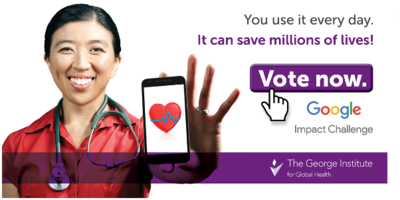
Solution to saving lives just a text message away
The George Institute for Global Health is calling on governments to employ a simple text message system to improve the health of heart attack survivors, following the release of a study which shows its success at helping to reduce cholesterol, blood pressure and weight.
Associate Professor Clara Chow, Director of the Cardiovascular Division at the Institute and cardiologist at Westmead Hospital, said m-health strategies like this, which could be included in national health reforms, had the potential to prevent second heart attacks and save thousands of lives.
“Around 55,000 Australians go to hospital with a heart attack every year and around a third of those are repeat heart attacks,” Assoc Prof Chow said.
“The second attacks are more dangerous, with one in five being fatal, compared to one in 10 for the first time heart attack.
“Despite this, after 12 months of their attack up to 40% of people no longer take medications they are supposed to be on and many more are not making the lifestyle changes needed to prevent recurrence.
“The Tobacco, Exercise and Diet Messages (TEXT ME) trial took a very simple mobile health strategy and found that it works to reduce the risk factors in these people.
“Ultimately we’re trying to save lives. We know that more than 4,000 incidents and 1,880 deaths could be stopped every year if we reduced repeat heart attacks by 25 per cent. It would be great if we could achieve this.
“Every heart attack costs $281,000 to the community, and that includes direct health care costs as well as lost productivity, so any money saved through prevention is good for everyone.”
Associate Professor Chow said the trial looked at 710 people from Westmead Hospital, with proven coronary heart disease.
“Just under half, or 352, received four text messages per week for six months in addition to standard care, while the remainder received their standard care,” she said.
“Utilising information from sources including the Heart Foundation, the messages gave advice and motivational reminders about things like diet and nutrition, exercise and smoking.
“Sometimes people just need ongoing encouragement to change their lifestyles, especially when they are confronted with the daily challenges outside of hospital and this program addresses that problem.”
“It’s also cheap, with the text messages costing just $14 per patient for a six month period.”
The TEXT ME study, which was published in the Journal of the American Medical Association (JAMA) found:
- The program led to significant reductions in cholesterol, systolic blood pressure and body mass index
- Patients were substantially more likely to exercise regularly and become non-smokers when receiving the text messages
- There was a high level of acceptability of the program, with an overwhelming number finding the messages to be of use and appropriate
The National Heart Foundation was the major funder of the study and National CEO, Mary Barry said she was pleased to see the information that’s readily available on the charity’s website being used in such a beneficial way.
“People can feel bombarded with health information that often conflicts itself from one source to another, however through this study we can see clear results that when information is targeted to an individual’s health concerns the impacts can be very positive,” Ms Barry said.
“We know that we need to be more savvy with how our information is delivered to patients and this study provides us with another bow in our armour in the fight against heart disease – the single leading cause of death for Australians.”
Associate Professor Chow said this was a program the government could introduce with immediate results.
“The number of heart attacks is expected to grow in Australia, with increasing age, obesity and diabetes, and we need action to curb this epidemic now,” she said
“It’s predicted that by 2020 the number of repeat heart attacks will increase by 34 per cent, to 21,631 per year and the number of people dying from repeat heart attacks will increase more than 40 per cent to 7,520.
“We are committed to rolling this program out to hospitals around the country, and continuing to test the benefits.
“It is something that hospitals could routinely provide as part of the discharge program for patients with heart attacks or even other conditions such as stroke.”
“This is one of those relatively rare things in medicine that saves money and could save lives also, so given its simplicity and the results of this research, it really is a no brainer.”
The trial was published as Effect of Lifestyle-Focused Test Messaging on Risk Factor Modification in Patients with Coronary Heart Disease and can be found at http://jama.jamanetwork.com/article.aspx?doi=10.1001/jama.2015.10945






